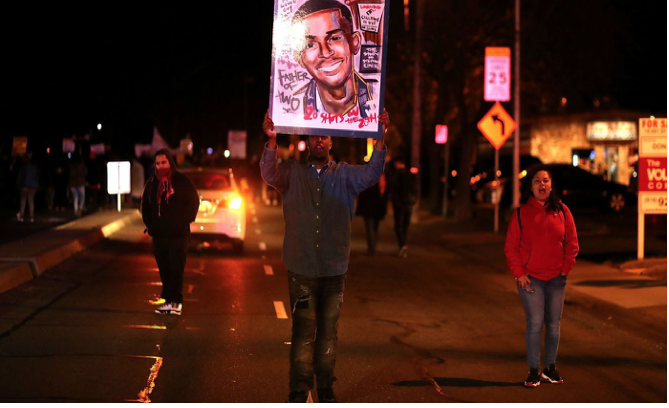CommentsURBAN PERSPECTIVE--The tragic fatal shooting of Stephon Clark has captured the nation’s attention and elevated the conversation around whether police can and should investigate themselves, especially when the public’s trust weighs in the balance.
The 22-year-old father of two was an unarmed black man who was fatally shot on March 18 by Sacramento police officers eight times, mostly in his back, according to an independent autopsy released last Friday.
The Clark family has accused the police department of trying to cover up misconduct by its officers and decided to conduct its own autopsy.
In the wake of Stephon Clark’s death, there are deafening calls from the community for more transparency and accountability regarding the investigation into his death. These calls also include answers to the lingering question of why did the officers decide to mute their audio. Ironically, the one group put into place to be a link between the community, City Hall, and the police won’t be able to help.
The 11-member Sacramento Community Police Review Commission was established in 2017 by the City Council last year as part of a package of police reforms after the community complained that a previous version of the commission didn’t have enough oversight capabilities.
But like most citizen watchdog groups established by mayors and city councils in cities in the wake of mounting concern over the question of “Who polices the police?,” the Sacramento Community Police Review Commission is merely advisory.
Most independent oversight commissions lack independence. They are unable to conduct their own investigations, subpoena records or to compel the testimony of police officers and their superiors accused of wrongdoing.
In March, a judge stripped Newark’s Civilian Complaint Review Board of its subpoena and investigatory powers but said it could still conduct oversight of the police department.
The board was conceived following a report released by the U.S. Department of Justice in July 2014 that found Newark police failed to provide sufficient constitutional reason for about 75 percent of pedestrian stops and that despite hundreds of citizen complaints from 2007 to 2012, just one complaint of excessive force was sustained.
In San Diego a proposed charter amendment would replace their Citizens Review Board on Police Practices with a new Commission on Police Practices that would among other things have the power to “to subpoena civilian witnesses, compel their attendance, administer oaths and affirmations, take evidence, and require by subpoena the production of any books, papers, records, or other items material.” The amendment also says that the commission “must seek and receive legal advice from independent legal counsel, not the Office of the City Attorney.”
Police reform has been a serious issue in Chicago in the wake of the release of the video showing the fatal shooting of Laquan McDonald. McDonald was a black teen who was shot 16 times after walking away from police –contradicting the police’s story that he was threatening or had “lunged at” cops. In the aftermath of the video’s release, then-police Superintendent Garry McCarthy was fired, Cook County State’s Attorney Anita Alvarez lost re-election, and officer Jason Van Dyke became the first Chicago cop in decades to be indicted for first-degree murder for a fatal officer-involved-shooting. Currently, community groups are proposing the creation of a civilian board with the power to fire Chicago’s police superintendent and to set Police Department policy. Mayor Rahm Emanuel has not taken a position of support or opposition.
In Los Angeles, efforts have begun to change the charter of the county via ballot measure to provide their Civilian Oversight Commission with subpoena power to effectively investigate deputy misconduct. The Reform L.A. Jails ballot measure also seeks to ensure that the Los Angeles County Board of Supervisors, the governing body for America’s most populous county and largest jail system, invests some of the $3.5 billion planned for building new jails into providing alternatives to incarceration. Proponents need to gather over 150,000 signatures of registered voters to place it on the highly coveted November gubernatorial ballot. Reform L.A. Jails will hold a campaign kickoff for their signature-gathering drive this week.
Civilian oversight bodies are put into place because the public has lost faith in their scandal-ridden beleaguered police departments. But these groups often end up being more of conciliatory gesture from local governments to placate the public in troubled times. They are prevented from doing the very work that both city officials and police departments claim they want to be done–improving public accountability and transparency. To root out misconduct, bring about real criminal justice reform and avoid having Bonnie investigate Clyde, these civilian bodies that hold the trust of the public must have two things–independence and power. Without it, they’re just for show. Oversight with no site. Overnight with no bite.
(Jasmyne Cannick is a nationally known writer and commentator on political, race and social issues .. and a contributor to CityWatch. She is a political consultant working on the LA County ballot measure to Reform LA Jails. Patrisse Cullors is the New York Times bestselling author of “When They Call You a Terrorist” and the co-founder of Black Lives Matter, Dignity Power and Now and JusticeLA. She is a proponent on the Reform LA County ballot measure to provide subpoena power to the Los Angeles County Sheriff’s Department’s Civilian Oversight Commission.)
-cw
















